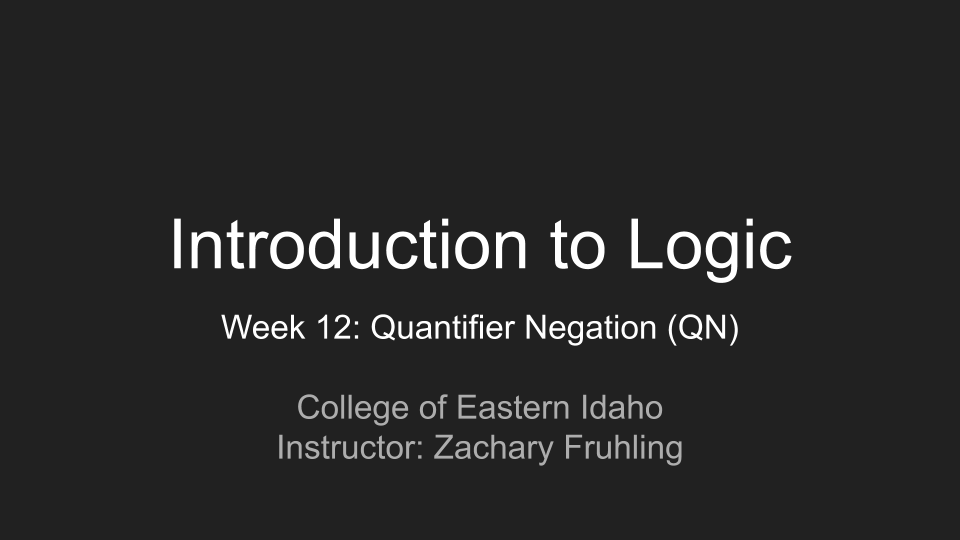Postmodern Education and the "Future Tech Learning Center"
(Future Tech Learning Center, College of Eastern Idaho)
40 years ago, the French philosopher Jean-François Lyotard wrote about the present and future state of higher education in a technological, postmodern age. In his best-known work, The Postmodern Condition: A Report on Knowledge, Lyotard claims that we’ve lost nostalgia for a great many of the grand narratives, or “meta-narratives” as Lyotard calls them, of society as a whole and of education in particular. We formerly told grand narratives—stories—about the purpose and ends of higher education: that it would promote democracy and freedom, that it would lead to both technological and social progress, that it would increase our quality of life, that it would raise citizens of the highest order, and so on. The defining characteristic of our postmodern age, according to Lytotard, is that we have “lost nostalgia for the lost narrative.”
According to Lyotard, higher education in a postmodern, technological age will become increasingly concerned with performativity, outcomes, skills, and marketability—less concerned with knowledge, education, truth, and learning for their own sake. The purpose is no longer to make good humans, or even Americans, in some Aristotelian sense, but to fulfill an economic, political, and societal function, to ensure adequate return on investment in the form of jobs and the competent workers to fill them. “How could one possibly argue with this turn toward performativity?” one might wonder. After all, people need jobs, and educational institutions are supposed to help people obtain the skills they need to get those jobs, right?
Last week I was introducing my Introduction to Philosophy students to the concept of postmodernism by doing a deep dive into Lyotard’s The Postmodern Condition. Lo, and behold, immediately upon returning home from class on Wednesday, I received the following email alert about College of Eastern Idaho in the news—a press release about the construction of a new “Future Tech Learning Center” at the college. Wildly positive, almost (certainly) political in tone, the article describes in unabashedly optimistic terms the way in which the college will be the technological path to the future—a future of technical skills, well-paid local job opportunities, and with flexibility to teach the technology of the future, no matter what technological changes are coming our way:
While reading this article, I was struck by the way in which the optimism of the article is sustained using language using the very features of higher education in the postmodern age about which Lyotard wrote over four decades ago—proof, perhaps, that Lyotard’s predictions about the future state of postmodern higher education have come to pass.
Compare, for example the following passages from Lyotard’s The Postmodern Condition and the CEI Local News 8 press release respectively:
Lyotard: “The desired goal becomes the optimal contribution of higher education to the best performativity of the social system. Accordingly it will have to create the skills that are indispensable to that system…. [Universities] and the institutions of higher learning are called upon to create skills, and no longer ideals—so many doctors, so many teachers in a given discipline, so many engineers, so many administrators, etc. The transmission of knowledge is no longer designed to train an elite capable of guiding the nation toward its emancipation, but to supply the system with players capable of acceptably fulfilling their roles at the pragmatic posts required by its institutions.”
CEI Press Release: “We must continue to invest in education and workforce development to ensure our workforce is ready for the growth we are experiencing…. Eastern Idaho is a corridor for research in technology and energy, and this latest investment is a welcome step in our state’s path to prosperity….” (Governor Brad Little)
Not only is this unabashed emphasis on technological skill development fully expected in our technological age, but the press release cited above unabashedly assumes that a technological education is the kind of education that will produce what the state and local economies need most: competent workers to fill their respective niches in local industries and at local companies. The rest of the human experience, and the human educational experience, will presumably take care of itself once we have qualified technical workers earning a livable wage and fulfilling their functions, so goes the hidden assumption about the value of technology in the cited press release.
The parallels continue. Consider the following additional passages from Lyotard’s The Postmodern Condition and the CEI press release, respectively:
Lyotard: “[The] University is beginning, or should begin, to play a new role in improving the system’s performance—that of job retraining and continuing education. Outside the universities, departments, or institutions with a professional orientation, knowledge will no longer be transmitted en bloc, once and for all, to young people before their entry into the work force: rather it is and will be served “a la carte” to adults who are either already working or expect to be, for the purpose of improving their skills and chances of promotion, but also to help them acquire information, languages, and language games allowing them both to widen their occupational horizons and to articulate their technical and ethical experience.”
CEI Press Release: “Idaho Senators Jim Risch and Mike Crapo said the program will help advance career and technical opportunities for those with interests geared toward specialized technology and energy industries like those at the Idaho National Laboratory.
“It will be the first career technical education (CTE) building for the College of Eastern Idaho. We are the only college in Idaho that does not currently have that type of building,” Ann Marie Peters, director of strategic partnerships for CEI said. “So it’s going to be a great addition for us, a great way for us to help students to improve their quality of life and get a family-wage living that’s appropriate to this area.””
While it’s clear that CEI and colleges like it are attempting to create a viable pathway for job-seeking students and local residents to a well-paying technical job, it cannot be denied that the shift away from higher education and an academic life for their own sake toward an outcomes-based (skills/job-based) approach to education is at the very heart of what Lyotard predicts in the shift away from traditional academics to postmodern education-as-skill-development. “We’ve stopped believing the old narrative that education makes a better world and better citizens, but it can at least make qualified workers who fulfill their functions, get their paychecks, and go home to live a social acceptable and respectable life,” say both the postmodernist and the proponents of skills-based education—although the disbelief in the old narratives around the purpose of higher education is usually just implied, not admitted outright.
But wait, there’s more. Consider what Lyotard has to say subsequently in Section 12 of The Postmodern Condition (Education and Its Legitimation Through Performativity):
Lyotard: “In any case, even if the performativity principle does not always help pinpoint the policy to follow, its general effect is to subordinate the institutions of higher learning to the existing powers. The moment knowledge ceases to be an end in itself—the realization of the Idea of the emancipation of men—its transmission is no longer the exclusive responsibility of scholars and students. The notion of “university franchise” now belongs to a bygone era. The “autonomy” granted the universities after the crisis of the late 1960s has very little meaning given the fact that practically nowhere do teachers’ groups have the power to decide what the budget of their institution will be; all they can do is allocate the funds that are assigned to them, and only then as the last step in the process…. To the extent that learning is translatable into computer language and the traditional teacher is replaceable by memory banks, didactics can be entrusted to machines linking traditional memory banks (libraries, etc.) and computer data banks to intelligent terminals placed at the students’ disposal. Pedagogy would not necessarily suffer. The students would still have to be taught something: not contents, but how to use the terminals…. If the motivation is power, then this aspect of classical didactics ceases to be relevant. The question (overt or implied) now asked by the professionalist student, the State, or institutions of higher education is no longer “Is it true?” but “What use is it?” In the context of the mercantilization of knowledge, more often than not, this question is equivalent to “Is it saleable?” And in the context of power-growth: “Is it efficient?” Having competence in a performance-oriented skill does indeed seem saleable in the conditions described above, and it is efficient by definition. What no longer makes the grade is competence as defined by other criteria—true/false, just/unjust, etc.—and, of course, low performativity in general.”
Compare the conclusion that Lyotard draws from the insights about the changing nature of education above with corresponding language in the CEI press release:
Lyotard: “This creates the prospect for a vast market for competence in operational skills. Those who possess this kind of knowledge will be the object of offers or even seduction policies. Seen in this light, what we are approaching is not the end of knowledge—quite the contrary. Data banks are the Encyclopedia of tomorrow. They transcend the capacity of each of their users. They are “nature” for postmodern man.
CEI Press Release: “Nuclear operator, nuclear technician, cyber technician, and computer network technician are some of the current job titles CEI will be aiming to train and fill with prospective graduates from Future Tech. Peters says in the future, they plan to train battery and solar technicians, which will be in demand in the future job market….
“We’re working on making sure that we have the best facility possible,” [Ann Marie] Peters said. “That’s why we’re calling it Future Tech, because it’s really future thinking in terms of both the physical building as well as the curriculum.””
For educational institutions—and their students—to thrive, we have to make them ready for the workforce of tomorrow, goes the reasoning, and that means cranking out graduates with the technical skills of tomorrow—nuclear technicians and such—ready for their first day at work, lucky them, at Idaho National Laboratory (INL), Naval Reactors Facility, and other local companies and industries. To do otherwise, would be irresponsible and do a disservice to our job-seeking student consumers and customers, right? (Insert your own conclusion here.)
Also in keeping with these postmodern times is the fact that this new technology learning center will have a flashy name and undoubtedly eventually the branding to go with it: “Future Tech”! Education cannot look to the past but should look to the future, right? And what better way to promote the inevitability and educational virtuousness of “Future Tech” than to give the entire educational philosophy on which it is built, “Career Technical Education,” an acronym: “CTE”?
“Count me in. I’m sold. Where do I sign the check?” says the typical American taxpayer and politician. We don’t want to be seen as backward, so we will train our students in the technology of the future instead of building good character and focusing on a liberal arts education for its own sake—after all, Plato has always had relatively low performativity, at least in popular opinion (even in his own time!)—ignoring, that is, my day-job salary, even with a “useless” philosophy degree, of $43.27 per hour instead of the $22–$28 per hour wage touted and hyped in the CEI press release:
CEI Press Release: “Peters says CEI anticipates that a technical certification from Future Tech will land future students in a career with $22–$28 per hour starting wages not including benefits.
Dean of student affairs at CEI, Mike Walker says Future Tech involves employer partnership where CEI works with employers to hire recent graduates from various career paths. Some of these employers include INL, Elevation Labs, Melaleuca, and Premier Technologies.
“It’s a really great opportunity for students to not only make that $28–$29 an hour job, but to also have a career pathway,” Walker said. “And hopefully with a future and other types of partnerships, we can build on those pathways.”
As Lyotard claimed (warned?) 40 years ago, we are breeding a generation of students who know only how to fulfill their function, not to love learning for its own sake—a generation (now generations!) of students who can think critically only with respect to their own function and their own skills—skills chosen not even by themselves but by the perceived needs of society and the local economy chosen for them by those who control the influx of dollars into institutions of higher education. We are creating cogs in the machine, not free and autonomous individuals with character, passion, and the inner strength to make the hard choices in life, to think outside the box, or to break the mold. But at least they can put dinner on the table—likely an Ikea table at $22 per hour.
Don’t get me wrong. It would be very easy to misunderstand me here. I am a huge fan and proponent of technology. I have worked professionally in educational technology for over a decade, and I am technically inclined otherwise. I have, for example, been a licensed amateur radio operator since I was 13 years old, and I dabble in programming, coding, etc. both professionally and in my own sweet spare time. Yet, there is something deficient about a person, student, or institution of higher education that focuses on technological development at the expense of human development. Just as eliminating the music program at the high school in the film Mr. Holland’s Opus was a knife in the educational heart of teachers, students, and culture alike, technological education at the expense of human education through the liberal arts is an affront to a progressive vision of the purpose of higher education—at odds with the very reason for the existence of higher educational institutions in the first place, at least as they were initially conceived in the “before times” when wisdom and character mattered more than performativity and marketable skills.
I have no doubt that “Future Tech” will lead to well-paid jobs and substance of graduates through the career paths of their (our?) choosing. They will “thrive,” in some uninspired sense of the word, for they will never learn to question who they are, where they (we) are going, explore the many possibilities and options and magic of life, and they will never be the wiser because we will have steered them to the destination long before they ever got comfortable with the journey of life with its many unknowns, uncertainties, and vicissitudes. Life will be safe for future tech workers, but it won’t be fulfilling, at least until their first midlife crisis that we are inevitably steering them toward when they realize they never really lived their lives for having spent it in the bowels of a nuclear reactor, polishing the brass of their own successful but disappointingly average lives.








